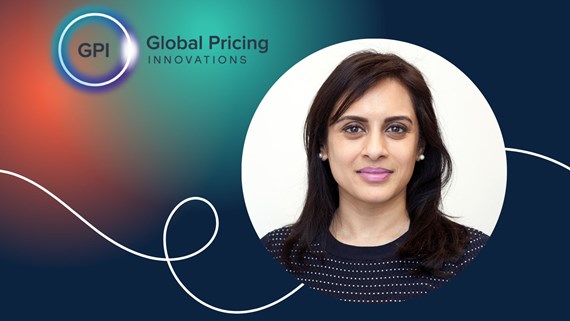Inspiration Series: an interview with Preeti Patel, founder of Global Pricing Innovations
Insight

Preeti Patel is the founder of Global Pricing Innovations (GPI), a growing price and access insights company that uses analytics to provide data-driven, evidence-based support, and helps clients (such as pharmaceutical companies) make better investment decisions for drug commercialisation. The overall aim of GPI is to disrupt the way medicines are brought to the market to ultimately provide patients with sustainable access to life-saving drugs. We caught up with Preeti to find out more about her journey.
Tell us a bit about your background and how the idea of GPI came about?
I trained as a pharmacist and spent the early part of my career working across the private and hospital sectors before taking a secondment at the Department of Health to work on a project focusing on how the NHS purchases medicine. Partnering with a top-tier consultancy firm, we redesigned the procurement and tender system to ensure best value for the NHS. The thesis of the project was largely based on the capture of huge amounts of data from hospitals to provide purchasing insights which then fed into a newly built procurement system allowing the NHS to bid for medicine, promote healthy competition and ensure the best value for patients. This project sparked my passion for the power of data and medicine pricing and access.
After gaining more experience from a consulting and industry perspective, I took the step to set up my own business and fulfil the vision for Global Pricing Innovations, largely centred around sustainable pricing and access strategies using a combination of data, analytics, and domain expertise to inform decision-making for medicine commercialisation.
How has the business changed over the years?
GPI started as a small team of three (me plus two employees in Mumbai) and grew to a team of around 70. We have been through some turbulent times, from Brexit, where we were impacted by both currency fluctuation and the loss of European talent, to Covid, which was a situation that no business (let alone a growing one) could have anticipated. We were fortunate enough to survive both events by taking many difficult decisions and pivoting. One positive outcome of the pandemic, however, was a shift in the pharmaceutical industry to embrace new technology in a bid for more efficient and effective working. Post-pandemic, the mindset moved to openness around the use of data, tech and AI in the re-engineering of strategies, especially with regards to drug development and commercialisation. GPI has focused on research and development, developing innovative techniques to solve critical business questions. The business has evolved from a creative, family-style culture to a more structured environment while still retaining core values.
How is GPI driving change in the life-science industry?
The drug commercialisation process has become increasingly complex with the advent of innovative medicines, curative treatments and gene therapy. Many valuable medicines have a challenge with market and patient access due to cost, access and funding barriers, and this is happening worldwide. GPI appreciates the patient perspective but also understands the commercial need for biopharma companies, who ultimately need viability for the drugs they produce (we are talking about truly innovative drugs that can cure or prevent serious illnesses such as rare tumours or blood diseases).
GPI is driving change by providing valuable insights to biopharma companies to support decisions regarding the value of an asset early in the life cycle, ensuring sustainability so the right drugs enter the sector and are valued accordingly by both payers and patients.
At what point will you look at your business and consider it a success?
I’d consider survival through Brexit and the pandemic a success for the business. Personally, however, I would love to see Horizon, which is our new analytics methodology, utilised by every biopharma as a gold standard. I’d consider this a huge success. Horizon helps decision makers consider the value of a new asset across indications and countries ensuring that the most valuable therapies are prioritised. It took the team nearly four years to come up with the concept and to test the viability, but the turning point was winning a prestigious award for Horizon which confirmed that we were on the right path.
How have you found being a female leader in tech?
There aren’t enough female leaders in the technology sector, so it is important that we do all we can to support and encourage women in tech businesses, and any new business, particularly when it comes to fundraising. Women are massively under-represented among venture capital (VC) investors, with companies founded solely by women receiving less than 3 per cent of all VC investments. That’s a pretty stark statistic.[1] GPI is lucky to have lots of female talent in the team both at board and investor level. I firmly believe that the strongest and most creative teams come from diverse environments.
What would your advice be to other entrepreneurs who are just starting out?
It’s so important to constantly reflect and personally grow. You’re not going to get everything right from day one, and in fact you will make 100+ mistakes, but what is important is learning from them. You also need to surround yourself with good people, and not necessarily just people you get on with, but those individuals who share your values and ethics, with the ability of bringing something to the table. I take counsel from mentors to aid my professional growth and sound out key decisions, and I’d highly recommend budding entrepreneurs do the same early in the journey to benefit from experience.
Also, have a clear view of where you are heading, ask yourself what does the end look like for you and work backwards. Stay true to your vision and purpose and dig deep as resilience and determination are key attributes that will get you through the journey. Every stage will be filled with fulfilling, exhilarating and challenging moments, the best advice I can give is enjoy the journey because once it stops, you may want it to start all over again.
This publication is a general summary of the law. It should not replace legal advice tailored to your specific circumstances.
© Farrer & Co LLP, August 2023
Footnotes:
[1] https://hbr.org/2023/02/for-female-founders-only-fundraising-from-female-vcs-comes-at-a-cost







